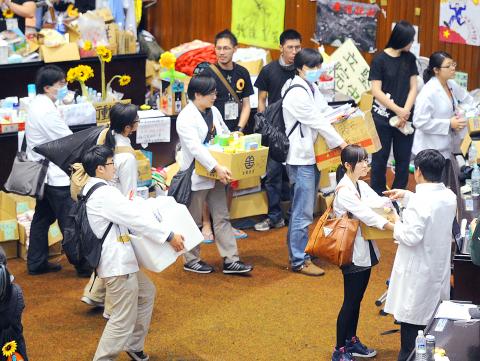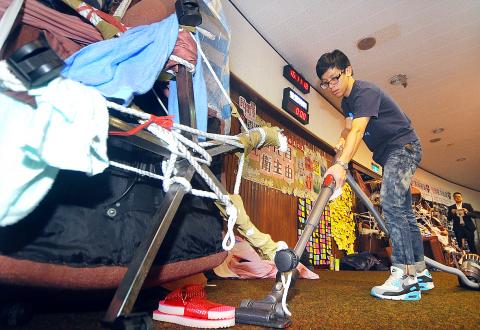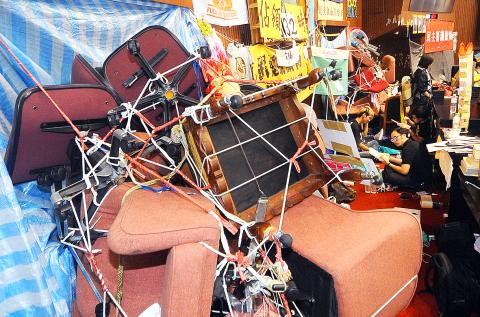Student protesters occupying the Legislative Yuan’s main chamber yesterday began cleaning up the room, following their leaders’ announcement on Monday night that they plan to withdraw from the legislature at 6 pm tomorrow.
Some students vacuumed the carpet, rolled up sleeping bags and rearranged the furniture, while others cleaned the desks and podium, taking down the posters and banners plastered around the chamber after protesters began their occupation on March 18 to protest the government’s handling of the cross-strait service trade pact.
A Facebook page was set up early yesterday morning by netizens who support the Sunflower movement, calling for public help and donations to repair and pay for any damage to the legislature.

Photo: Wang Min-wei, Taipei Times
Titled “Repairing 318 Legislative Yuan,” the page went online just a few hours after the student leaders of the protest announced their withdrawal plan.
Legislative Yuan staffers have previously said that the student occupation damaged chairs, doors, carpets microphones, the broadcasting system and some valuable paintings. Some local media reports have quoted unnamed sources as saying the repairs and clean-up operation could cost more than NT$100 million (US$3.3 million).
Employees of the Legislative Yuan’s General Affairs Department yesterday entered the main chamber to begin assessing the damage.

Photo: Liao Chen-huei, Taipei Times
Unconvinced by reports of multimillion dollar estimates, the “Repairing 318 Legislative Yuan” Facebook page asked construction, engineering, design and broadcasting experts to assess the venue and help give their own estimates for repair jobs.
The page has received several fervent responses, with one netizen saying that “the student protesters have written a new chapter in Taiwan’s history and pushed your future and mine in a good direction. In return, they faced legal charges and the burden of hefty repair bills.”
While some Chinese Nationalist Party (KMT) lawmakers have said that the government should not use taxpayers’ money to cover the restoration costs, General Affairs Department head Tsai Wei-min (蔡衛民) turned down the offer from netizens to help pay, saying the legislature will take care of the operation.

Photo: Liao Chen-huei, Taipei Times
Meanwhile, the Democratic Front Against Cross-Strait Trade in Service Agreement yesterday appealed for public donations, saying the student protest movement is NT$2.53 million in debt as of Monday.
A netizen named “omanorboyo” reposted the request on the Professional Technology Temple (PTT) — the nation’s largest academic online bulletin board — saying: “It is time for us to come forward, at least so the students can exit honorably, without [financial] burdens.”
Additional reporting by CNA

A preclearance service to facilitate entry for people traveling to select airports in Japan would be available from Thursday next week to Feb. 25 at Taiwan Taoyuan International Airport, Taoyuan International Airport Corp (TIAC) said on Tuesday. The service was first made available to Taiwanese travelers throughout the winter vacation of 2024 and during the Lunar New Year holiday. In addition to flights to the Japanese cities of Hakodate, Asahikawa, Akita, Sendai, Niigata, Okayama, Takamatsu, Kumamoto and Kagoshima, the service would be available to travelers to Kobe and Oita. The service can be accessed by passengers of 15 flight routes operated by

GIVE AND TAKE: Blood demand continues to rise each year, while fewer young donors are available due to the nation’s falling birthrate, a doctor said Blood donors can redeem points earned from donations to obtain limited edition Formosan black bear travel mugs, the Kaohsiung Blood Center said yesterday, as it announced a goal of stocking 20,000 units of blood prior to the Lunar New Year. The last month of the lunar year is National Blood Donation Month, when local centers seek to stockpile blood for use during the Lunar New Year holiday. The blood demand in southern Taiwan — including Tainan and Kaohsiung, as well as Chiayi, Pingtung, Penghu and Taitung counties — is about 2,000 units per day, the center said. The donation campaign aims to boost

ENHANCING EFFICIENCY: The apron can accommodate 16 airplanes overnight at Taoyuan airport while work on the third runway continues, the transport minister said A new temporary overnight parking apron at Taiwan Taoyuan International Airport is to start operating on Friday next week to boost operational efficiency while the third runway is being constructed, the Ministry of Transportation and Communications said yesterday. The apron — one of the crucial projects in the construction of the third runway — can accommodate 16 aircraft overnight at the nation’s largest international airport, Minister of Transportation and Communications Chen Shih-kai (陳世凱) told reporters while inspecting the new facility yesterday morning. Aside from providing the airport operator with greater flexibility in aircraft parking during the third runway construction,

American climber Alex Honnold is to attempt a free climb of Taipei 101 today at 9am, with traffic closures around the skyscraper. To accommodate the climb attempt and filming, the Taipei Department of Transportation said traffic controls would be enforced around the Taipei 101 area. If weather conditions delay the climb, the restrictions would be pushed back to tomorrow. Traffic controls would be in place today from 7am to 11am around the Taipei 101 area, the department said. Songzhi Road would be fully closed in both directions between Songlian Road and Xinyi Road Sec 5, it said, adding that bidirectional traffic controls would